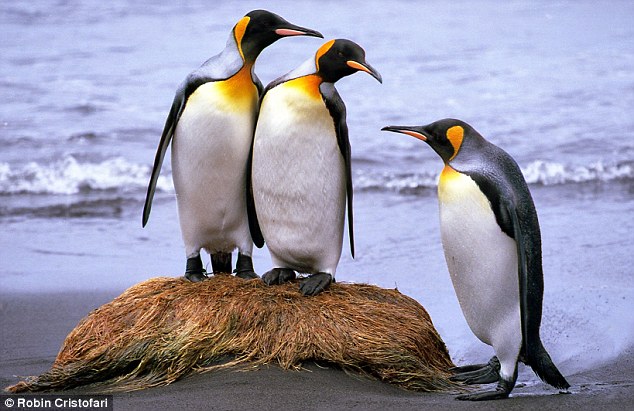King penguins could be wiped out in the near future by climate change and overfishing, new research has warned.
Melting ice will strip the birds of their breeding and feeding grounds, wiping out 70 per cent of the global population before the end of the century.
Only a decade ago the total king penguin population was over two million breeding pairs worldwide, but this has since dropped to 1.6 million.
Around 1.1 million of the remaining pairs will be forced to relocate or disappear if greenhouse gas emissions continue at present rates, experts say.
An international team of researchers, including experts from the University of Ferrara in Italy and the University of Strasbourg in France, studied the King Penguin’s habitat on the islands at the northern reaches of Antarctica.
Using computer modelling, they simulated the king penguin’s past habitat shifts and identified future vulnerable areas.
They predict almost half of the breeding pairs on the Crozet and Prince Edward Islands on Antarctica will lose their breeding and fishing grounds.
Meanwhile a fifth on the Kerguelen, Falkland and Tierra del Fuego islands will suffer badly due to increasing foraging distances.
Researchers say they may be ‘nothing more than a memory’ in a matter of decades as global warming forces the birds to move South – or vanish completely.
Dr Celine Le Bohec, of Strasbourg University, said: ‘If no actions aiming at halting or controlling global warming and the pace of the current human-induced changes – climate change, over-exploitation – stay the same, yes, the species may disappear in the near future.
‘Unless current greenhouse gas emissions drop, 70 per cent of king penguins will be forced to relocate their breeding grounds – or face extinction – before the end of the century.’
Numerous colonies will be lost, firstly on Crozet and Prince Edward Islands which represent 49 per cent of the current global population.
These are projected to lose their habitat completely.
Meanwhile king penguins breeding on the Kerguelen, Falkland and Tierra del Fuego islands, which represent 21 per cent of total numbers, will experience ‘strongly altered habitats due to increasing foraging distances.’
The projection is also likely to be an underestimate, according to the team, as it was based on ‘maximum foraging distance – after which no successful breeding is expected to take place.’


King penguins are extraordinary parents. While one is guarding the chick, the other makes a trip of up to 250 miles (400km) in search of food.
They are also picky. To form a colony where they can mate, lay eggs and rear chicks over a year they need tolerable temperature, no winter sea ice around the island and a smooth beach of sand or pebbles.
But, above all, they need an abundant and reliable source of to feed their chicks.
For millennia the seabird has relied on the Antarctic Polar Front – an area of the Southern Ocean where the colder and warmer water meet, drawing an abundance of plankton, krill and fish.


Yet, due to climate change, this region is drifting south, away from the islands where most king penguins currently live.
Parents are then forced to swim farther to find food, while their progeny is waiting, fasting longer and longer on the shore.
Using information hidden away in the animal’s genome, the research team reconstructed changes in the worldwide population throughout the last 50,000 years.
It showed king penguins are particularly versatile and have survived such crises several times – the last 20,000 years ago.
But this time it could be different as human activities are leading to rapid and potentially irreversible changes in the Earth system and remote areas are no immune.


In addition to the strongest impact of climate change in Polar Regions, the SouthernOcean is now subject to industrial fishing and penguins may soon have a very hard time.
The study was the most comprehensive of its kind to date and involved an international team from France, Monaco, Italy, Norway, South Africa, Austria and the US.
It found for most colonies the length of the parents’ trips to get food will soon exceed the resistance to starvation of their offspring. This will lead to massive king penguin crashes or relocation.
Cold-loving species are usually expected to move pole wards in response to global warming but the king penguins can only shift breeding grounds by using islands ‘like stepping stones.’
Dr Le Bohec added that competition for breeding sites and for food will be harsh, especially with the other penguin species like the Chinstrap, Gentoo or Adelie penguins , even without the fisheries.
She said: ‘There will surely be losses on the way – if we are to save anything, proactive and efficient conservation efforts but above all coordinated global action against global warming should start now.’
The full findings of the study were published in the journal Nature Climate Change.












